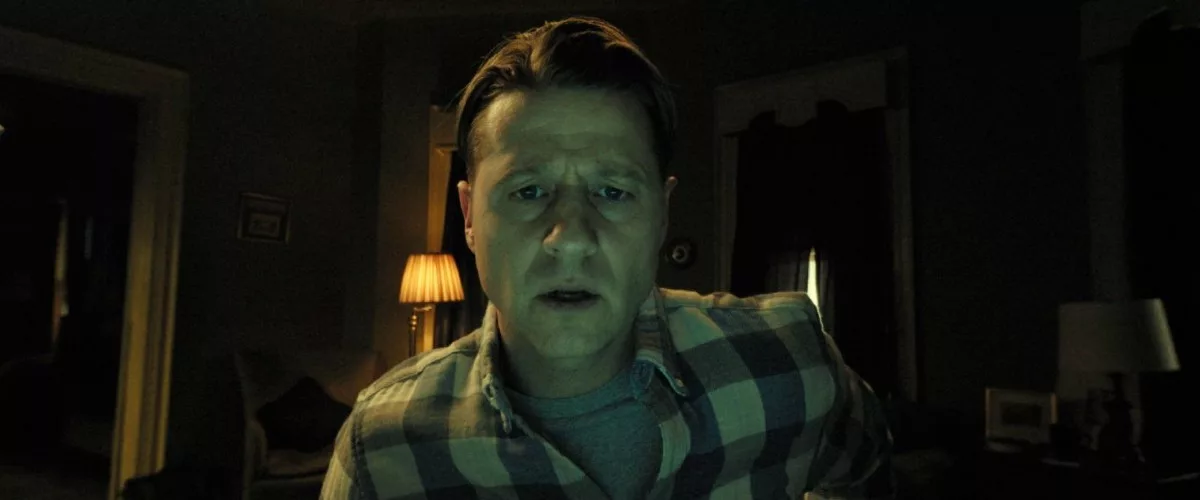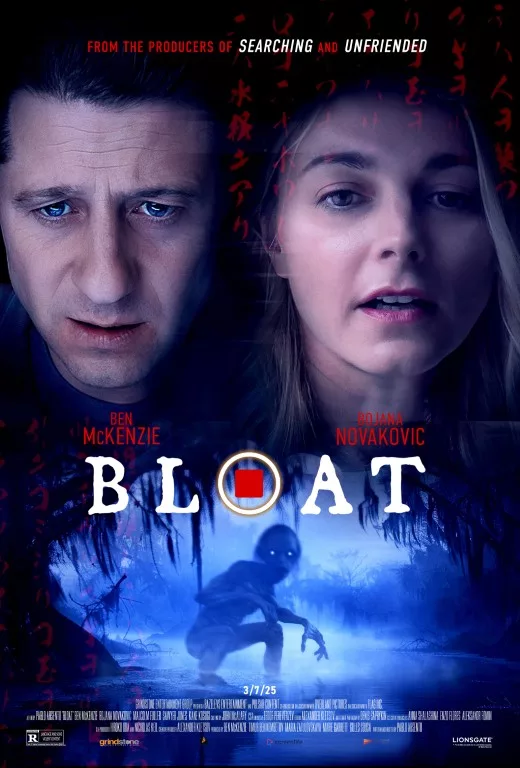Imagine a J-horror plot involving a child possessed by a swamp demon told through the aesthetics of the screenlife found footage subgenre, and you can pretty much imagine how writer-director Pablo Absento‘s new film, “Bloat,” will play out. Your mileage with her film will likely depend on how much you vibe with the tropes of either genre and also how much of your brain you want to check at the door.
TV stalwart Ben McKenzie stars as Jack, a Marine who is still reeling after the stillborn death of his third child, a daughter, who, in an attempt to bring his family closer together, books an extravagant vacation to Tokyo. Before the family can take off on their trip, however, his bereavement leave is cancelled when U.S. military bases in Iraq and Syria are attacked, and Jack must deploy to the Middle East immediately. His wife, Hannah (Bojana Novakovic), and two sons, Steve (Malcolm Fuller) and Kyle (Sawyer Jones), go on the trip without him. Jack checks in on his family via FaceTime videos while also doing his day job as an A.I. Operator who tracks excursions on the ground via drone footage via his computer screen from the comfort of the base.
Things quickly go awry when his youngest son, Kyle, nearly drowns in a pond and then begins exhibiting odd behavior like aggressively biting his brother and eating nothing but cucumbers. Soon, Jack finds himself on a dark web message board for parents who think their children are possessed, which spirals into him reading about digital ghosts and other paranormal phenomena. Jack may be spooked by what he sees, but it’s pretty tame stuff for anyone with any familiarity with creepypasta or other internet lore or has seen far superior films like “Ringu” or even its American remake.
After Kyle’s behavior becomes increasingly weird and violent, and Hannah shows signs of prescription drug abuse, Jack asks his friend and former squadron buddy, Ryan (Kane Kosugi), to continue his investigation on the ground in Japan. Slowly, the two come to believe Steve has been possessed by a creature known in Japanese folklore as a “Kappa.” The two then set out to get proof and figure out how to cure the boy before it’s too late.
Absento’s film resembles others produced by the screenlife subgenre’s pioneer, Timur Bekmambetov, whose producing credits also include the “Unfriended” and “Searching” franchises. Unfortunately, while the editing of the various elements that make up Jack’s screen life is slick, it’s also a missed opportunity for pushing the format forward. Occasionally, Absento hints at the irony of Jack’s job, in which he uses his screen to streamline the killing of unseen “militants,” with his attempt to patch up his broken family life through the same screen, as when Jack orders a drone to give his song for his birthday. There’s also some cheeky meta-humor when one of the many folders on Jack’s desktop is labeled “Crypto,” a reference to McKenzie’s real-life crusade against the crypto economy.
Yet the ease with which Jack can track his family’s locations with Apple device software like “Find My” and buy surveillance cameras to spy on them in the name of gathering proof, or that Hannah can order prescription drugs and have them delivered while on vacation, is presented with little to no commentary about what any of it says about the current state of human lives lived online, let alone the anxieties of contemporary family life. By the end, she also flirts with the same “family annihilator” tropes that Osgood Perkins explored in “Longlegs,” but without any real depth or point of view.
The same can be said about Absento’s integration of the “Kappa” mythology into the story. While it lends itself to new, at least to Western audiences, creepy child behavior, the mythology is left largely unexplored other than a vague notion and unexplored notion that these creatures have been targeting American children of military families because the creatures feel “trapped in their own homeland.” In fact, very little Japanese culture is actually shown on screen, with most of the action taking place in the family’s isolated lakefront AirBnB.
McKenzie does his best to act opposite all the images on his screen, but is not able to bring the same urgency and nuance to the role of Jack that John Cho brought to his role as a distraught dad in “Searching,” which ultimately netted him an Indie Spirit Award nomination. Novakovic is not given much to do and her interactions with McKenzie are stilted and awkward, and not in a way that indicates a deep relationship that has become fractured, or even a mother who has recently lost a child. Fuller shows promise in his few scenes opposite McKenzie, adding a sense of wisdom beyond his years emotional intelligence that elevates the film whenever he’s on screen.
As the possessed kid, Jones is great at screaming bloody murder, but due to the limits of the screenlife format, he is not given much else to do. I kept thinking about the great performance from Charlie Shotwell as the titular Eli in Ciarán Foy’s 2019 possessed child film and hoped “Bloat” would have a similarly unhinged ending. Despite a fiery penultimate scene, Absento’s film ends with a courtroom whimper. Jones gets the film’s last word, which I imagine was meant to evoke a spine-tingling chill but instead elicits nothing but a shrug.




















